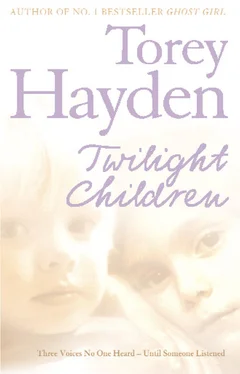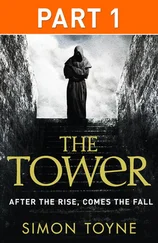“Ding-dong, willy-nilly, Peter Pan!”
She laughed again, writhed in her seat, and fluttered her hands. Then taking up a black marking pen, she drew strong black lines across the picture in a random, rather frenzied manner. The lines didn’t color over anything or appear to be there to cover up anything. The way she did them, they appeared to be just marks, slashes across the page, as if her inner environment had become too much to control and these marks simply exploded forth like lightning strikes.
Saying nothing, I just sat, waiting.
This outburst lasted about three minutes. Then slowly Cassandra came back into herself and grew quieter. She was still laughing in a rather peculiar way. It was almost what I’d describe as a lascivious, sleazy kind of laugh. Certainly it implied sexuality to me, which, I suppose, given the “snakes” and the outburst regarding “ding-dong,” “willy,” and “Peter,” was perfectly possible.
Still I said absolutely nothing. I kept my expression as bland as possible so that she would not interpret my silence as disapproving, but I continued to sit motionless.
At last Cassandra fell completely quiet. The interesting thing about this episode, to my mind, was that not once did she take her eyes off me during the whole course of it. Her eye contact was quite extraordinary, but it also implied to me that my reaction was very important to this whole little drama. I sensed she was doing it for me, that she was expecting me to behave in a certain manner as well and she had to keep a close watch in order to see what I was going to do or, possibly, to adjust her own behavior as necessary.
When she was finally reduced to sitting quietly again in the chair beside me, her great dark eyes still fixed on my face, I said, “You know, I think you did that as a way of getting away from what we were talking about. Sometimes magicians do that trick. They say, ‘Look over here,’ because they want your attention over here so that you aren’t paying attention to over there and they can hide something away without your noticing.”
There was a long, long silence. She pressed her hands together prayer fashion and pushed them down between her legs on the chair. Straightening her elbows, this pushed her shoulders up, like a frozen shrug. Her eyes were still locked on mine.
There was a flicker. She looked away for just a very brief moment, then back at me. “Can I go now?” she asked. “I’m tired. I’m done with this. I want to go back to the dayroom.”
The children’s psychiatric unit was on the seventh floor of the hospital. When one first came off the elevator and turned left, there was a long corridor that contained administrative offices, many of which were not affiliated with our unit. At the far end were the two sets of double locked doors through which one entered the unit itself. Immediately beyond the doors to the left was the nurses’ station, and to the right, the dayroom where the children gathered to relax and play when they weren’t in the unit classroom, attending therapy sessions, or participating in activities. The sleeping rooms were down two short corridors that branched off the opposite side of the dayroom from the nurses’ station. Most accommodated two children each, although there were four single rooms. All locked. In all, the unit could accommodate twenty-eight children between the ages of three and eleven.
Beyond the dayroom, to the left of the nurses’ station, was a third short corridor, and it was here where the two therapy rooms were, plus a miscellany of utilitarian rooms – an examination room, a med room, a walk-in linen room, and an odd little room that was about twenty feet long but only about six feet wide. Various kinds of technical equipment, like video cameras, recorders, and monitors, were stored just inside the door, whereas at the far end, there was a teeny, tiny kitchen, narrow as a boat’s galley.
It was down among these rooms that I had my office, which I shared with Helen, a clinical social worker, whose main task was liaising with children after they had left. Consequently, she spent only a small amount of time each week actually on the unit, and I normally had the office to myself.
The room was a curious mixture of the industrial and the macabre. A set of cast-iron pipes went through the room. This would have been ordinary enough, had they been in the corner of the room or ordinary-sized pipes, associated with something like the central heating. These, however, sprung up about three feet in from the near-side wall and varied in size between three and six inches in diameter, so it was like having a stand of trees in the office. Iron trees. Or rather, just their trunks, passing through the room.
Moreover, in the old days, the room had been used for electric shock therapy. This had long since been discontinued, but the evidence was still there in the form of odd knobs and disconnected wires and the indentations of long-since-removed equipment on the walls. These things had since been painted over, indeed, many times, giving them a blobby, indistinct form.
Midst this, Helen and I had managed to squeeze in our two desks, a large table, and two sizable bookshelves. As always, Helen’s side of the room was a triumph of order and organization. My side looked, as Helen succinctly put it, as if the condemned-building notice was overdue.
I had just returned to my desk from the session with Cassandra when there was a quick rap at the door, and it opened. Nancy Anderson stuck her head in. She was the charge nurse on the unit during the weekdays. In her fifties, a tall, strongly built woman of African American origins, Nancy had made a career of psychiatric nursing. She loved the job; she loved the kids, and decades of experience had given her a clear understanding of life’s absurdities, which meant her reaction to most things was a good laugh.
“This one’s for you,” she said, waving a piece of paper.
“What is it?” I asked and reached over for it.
“He’s asked specially for you. Read your research on elective mutism. Saw that article in the paper. Wants you .”
“Oh, good,” I muttered sarcastically.
I hated these – cases where the parents wanted a specific therapist or therapy – because they often came with wildly unrealistic expectations. Many were looking for miracle workers, nothing less, and it seldom worked out that miracles were in the cards.
“Harry’s looked it over,” Nancy said. “He says why don’t you arrange an opportunity to see the child sometime this week. There’s a space in his schedule to interview the parents next Friday, if that works for you. If they want to go ahead with something, if it looks right, there’s a space coming open on the unit a week next Wednesday.”
I took the paper from Nancy. “Geez. This is out in Quentin. Did Harry notice that?”
Nancy lifted her eyebrows in a “no idea” expression.
“That’s almost two hundred miles. It’s going to take over three hours of driving just one way. It’ll use up my entire day just to observe the kid for forty-five minutes.”
“I think that’s why they’re thinking of inpatient.”
“Surely they’ve got services in Quentin.”
“Well, they want you .”
I started reading. It was a personal letter from a man named Mason Sloane. He was the grandfather of the boy in question and the letter was written on the letterhead of a well-known regional bank.
Oddly, to my mind, the first thing Mr. Sloane established was his family business pedigree. They were majority shareholders in the bank, which had been founded in the late 1800s by his grandfather. Ownership and operation of the bank had passed from father to son through the generations and was now managed by Mr. Sloane’s son, who was a prominent businessman in Quentin, a small city of about thirty thousand.
Читать дальше












